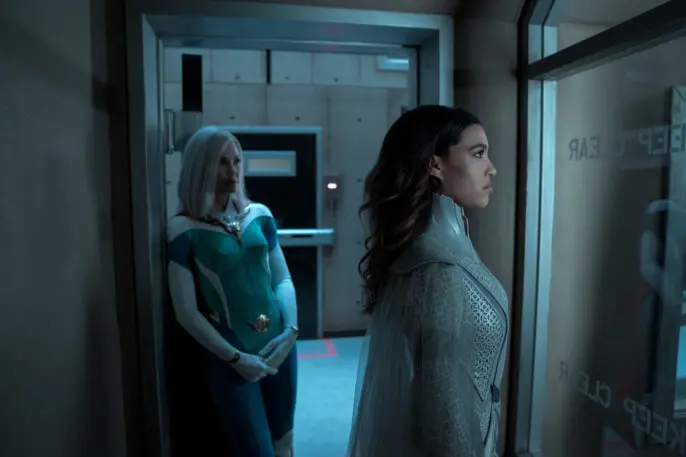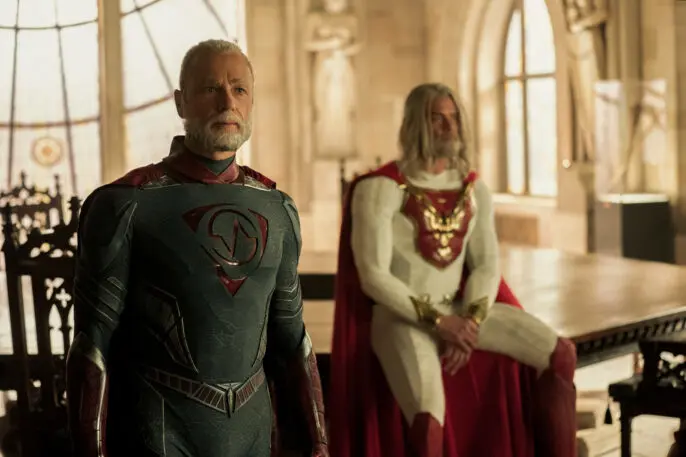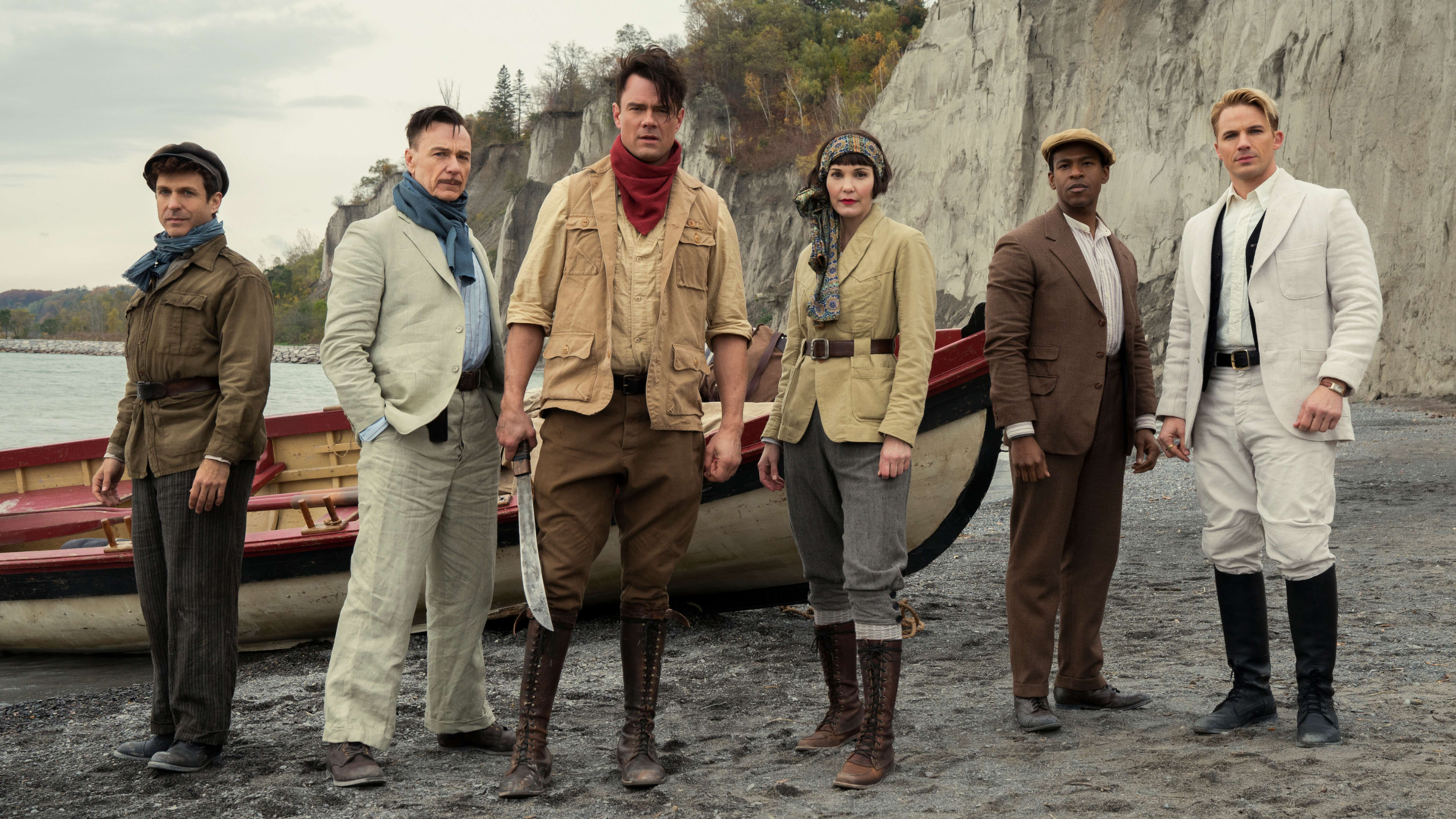When Netflix acquired the comic-book publisher Millarworld in 2017 for a reported $50 million to $100 million, Mark Millar, the company’s founder and president—as well as the author of titles such as Kick-Ass, Wanted, and Chosen—knew exactly what project he’d tackle first. “Our first priority was Jupiter’s Legacy,” he wrote in a blog post on Netflix’s site on Thursday, May 6, referring to his 2013 comic book about a multigenerational family of superheroes. He went on to say that he and his wife Lucy, the company’s CEO, “had flirted with the idea of a movie, but Netflix afforded us the chance to make this adaptation as big and deep as it needed to be.”
https://www.youtube.com/watch?v=TY3IAqm-gpE
The result is an eight-episode first season that drops on Netflix on May 7. The moodily-lit, drama-action series stars Josh Duhamel as a middle-aged patriarch of a family of caped crusaders who deal with the kind of family strife normal people do: kids who feel they can’t live up to their over-achieving parents, sibling rivalries, and too much wine at the family dinner table. Think Superman meets The Big Chill. Or, as is often the case with the stories dreamed up by Millar, a Scottish scribe who’s an alumnus of Marvel and DC Comics: What if? In this case: What if two superheroes got married and had kids? What would that be like?

For Netflix, Jupiter’s Legacy is more than just a new, cool series that the platform hopes will entertain its 200 million-plus global subscribers and inspire others to join them. The show is the streamer’s latest attempt to build another original franchise along the lines of its sci-fi mega hit, Stranger Things—that anomalous, culture-rocking show that resonated long after its initial appearance in people’s new content rows. Indeed, as Netflix is forced to fend off increasing competition from the likes of Disney Plus and HBO Max, it is looking for more of this kind of “event content,” as co-CEO Ted Sarandos put it on the company’s latest earnings call. Founder and co-CEO Reed Hastings elaborated further. “The thing that many studios are able to do is create great franchises,” he told The Hollywood Reporter in September. “We’re making great progress on that with Stranger Things and other properties, but compared to Harry Potter and Star Wars, we’ve got a long way to go.”
Comic book adaptations—with their built-in fan bases, dude appeal (as opposed to the female audiences who flock to series like The Crown and The Handmaid’s Tale), and ability to expand and drive other titles in the way that Marvel and DC’s cinematic universes do–can help mightily in this endeavor. The strategy has worked well already with series like The Umbrella Academy and helps explain the company’s recent, five-year deal with Sony to become the streaming home of its films, including Marvel’s Venom and the Spider-Verse sequel. The most attractive part of that deal is arguably Netflix’s ability to create original works using Sony intellectual property.
Netflix is upfront about the IP grab that Millarworld presents. Peter Friedlander, VP of original series as well as head of Netflix’s spectacle and event television department—a department that materialized last fall—said of the Millarworld acquisition: “Knowing Mark had this wealth of both existing IP that hadn’t been explored and characters that hadn’t been brought to life—we saw that opportunity and knew we had an audience for it.”
The hope now is to keep rolling out that IP. In his blog post, Millar also announced that other Millarworld titles were moving ahead at Netflix, including The Magic Order, a live-action sci-fi series whose development had been delayed last year in part due to the pandemic; American Jesus, a series that will have both English and Spanish dialogue; a film version of Reborn to be directed by Chris McKay (The Lego Batman Movie) and produced by Sandra Bullock and Vertigo Entertainment; and an anime series based on Super Crooks.

But if Netflix wants to turn Millarworld into a Marvel-style “Millarverse” that churns out interconnected TV shows and movies, there are challenges. For all of their shared comic book DNA, Marvel and Millarworld are distinct entities with unique models. Although some characters in Millarworld titles meet each other and interact, the stories aren’t nearly as intertwined as the Marvel or DC universes. (I.e., they’re not all New York City-based super heroes who bump into each other at dustups.) There also simply isn’t as much content to work with. Jupiter’s Legacy published 10 issues. A prequel, Jupiter’s Circle, followed up with 12 more. Compare that to The Amazing Spider-Man, which, not counting all of its spin-offs and sequels, has published 700 issues since it debuted in 1963. As one observer pointed out: “Both Marvel and DC have been around for 80-plus years and have thousands of titles. Millarworld has been around for just under 20 and has about 30 franchises.”
Friedlander acknowledges that the Millarworld expansion will take time. “We’re taking it step-by-step and being very deliberate with each title,” he says. “We’re taking the time to do right by each title. That’s really our direction now.”
In the meantime, Netflix is trying to move things along and deepen fan engagement by publishing the second and third issues of The Magic Order starting this fall. In 2018, the company first dipped its toe in comic book publishing when it came out with the original in the series. New titles that Netflix puts out can then be fodder for a future series or movie. But even publishing can be laborious, Friedlander says. “It takes time to do these comic books—get the art done, publish them.”
As for the four-year lag between the acquisition of Millarworld and the arrival of Jupiter’s Legacy, he says, “we knew we had the material, but you have to find the right voice and the people who have the passion to want to bring this to life. There’s that period of just finding talent. From there, we had to crack it. What are we going to do to bring this to life in a way that both honors the story that fans love? And also, what’s the bold approach?” Then there was the elaborate, effects-heavy production.
Something else that required time was “making super suits,” Friedlander says. “It took extraordinary amounts of conversation around both honoring what Mark’s vision was but also evolving them so they looked cool and exciting for fans. It’s not as simple as it would seem.”
Recognize your brand’s excellence by applying to this year’s Brands That Matter Awards before the early-rate deadline, May 3.
